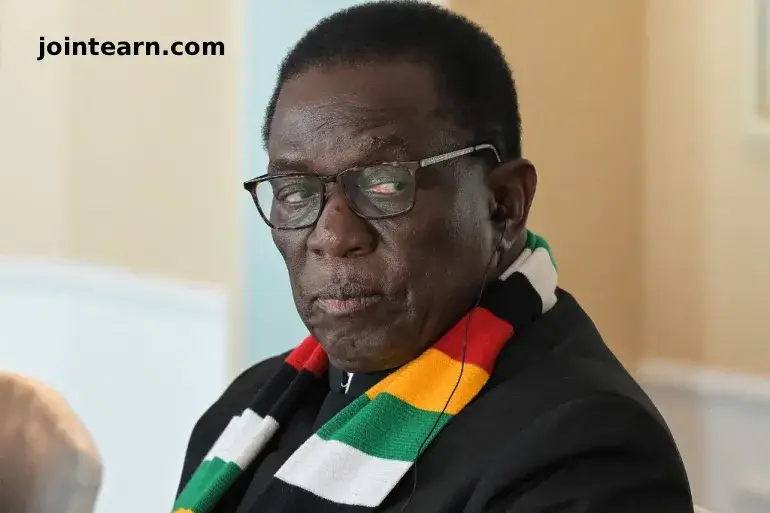
MUTARE, Zimbabwe — October 18, 2025 — Zimbabwe’s ruling party, ZANU-PF, has announced plans to extend President Emmerson Mnangagwa’s term in office by two additional years, potentially keeping the 83-year-old leader in power until 2030.
The proposal, endorsed during the party’s annual conference in Mutare, signals a deepening battle within ZANU-PF and raises constitutional questions that could ignite legal and political challenges across the country.
ZANU-PF Endorses Mnangagwa Term Extension
Justice Minister and ZANU-PF legal secretary Ziyambi Ziyambi confirmed that the party has instructed the government to begin drafting legislation to amend Zimbabwe’s Constitution.
The constitutional amendment would allow President Mnangagwa — currently serving his second and final term set to end in 2028 — to legally extend his presidency to 2030.
“The motion has been adopted,” Ziyambi told delegates, prompting loud applause from party loyalists. “We are beginning the process of aligning the law with the wishes of the people.”
However, legal experts have warned that any such move would require broad constitutional changes and possibly a national referendum, both of which could prove politically contentious.
Growing Divisions Within ZANU-PF
Despite the show of unity at the Mutare conference, ZANU-PF’s internal divisions are deepening. A faction aligned with Vice President Constantino Chiwenga, a former army general and architect of the 2017 coup that ousted Robert Mugabe, is reportedly opposing the extension.
Sources within the party say Chiwenga’s camp is quietly mobilizing to block the move, arguing that the Constitution must not be altered for personal gain.
Blessed Geza, a veteran liberation fighter and vocal Chiwenga ally, has criticized the proposal through YouTube livestreams that have attracted thousands of viewers. “This is not what we fought for,” he said, warning that extending Mnangagwa’s rule undermines the sacrifices of the liberation struggle.
Security forces have been deployed across Harare and Bulawayo amid fears of protests, though public demonstrations remain limited under Zimbabwe’s harsh anti-protest laws.
Mnangagwa Silent as Allies Defend the Move
President Mnangagwa, who came to power promising economic recovery and democratic renewal, avoided any mention of the term extension during his closing remarks at the conference.
His silence has done little to quell speculation about his ambitions. Insiders claim that his supporters — especially younger ZANU-PF loyalists who owe their political rise to him — are determined to secure continuity of leadership beyond 2028.
Meanwhile, Vice President Chiwenga has not commented publicly, fueling speculation that a power struggle could intensify as the 2028 elections approach.
Opposition and Legal Experts Promise Court Battle
Opposition leaders and constitutional lawyers have vowed to challenge any attempt to rewrite the nation’s supreme law.
“Tinkering with the Constitution for political convenience is unconstitutional,” said Tendai Biti, a leading opposition lawyer. “We will defend the Constitution against its capture and manipulation to advance a dangerous, anti-democratic agenda.”
Ten elderly activists were arrested in Harare on Friday for allegedly planning a protest calling for Mnangagwa’s resignation. Authorities accused them of “inciting public violence,” and they remain in custody pending a bail hearing on Monday.
Earlier this year, nearly 100 young demonstrators were detained under similar circumstances, reflecting a continued crackdown on dissent.
Zimbabwe’s Economic Crisis Deepens
Mnangagwa’s presidency has been overshadowed by a crippling economic crisis, rampant corruption allegations, and hyperinflation that has eroded citizens’ purchasing power.
Unemployment remains above 80 percent, and the Zimbabwean dollar continues to lose value, forcing millions to rely on informal markets and remittances.
Critics accuse the ZANU-PF government of eroding democratic institutions, weakening the judiciary, and turning elections into heavily managed exercises rather than genuine contests.
Background: Mnangagwa’s Rise to Power
Emmerson Mnangagwa, a long-time ally of the late Robert Mugabe, assumed power in November 2017 after a military intervention that ended Mugabe’s nearly four-decade rule.
His initial promises of reform and economic revival soon faded as allegations of repression and corruption persisted.
By 2023, Mnangagwa had secured re-election in a disputed vote criticized by international observers as neither free nor fair.
Now, with calls to amend the Constitution and extend his rule, critics warn that Zimbabwe risks returning to Mugabe-era authoritarianism, undermining hopes for democratic transition.
What’s Next for Zimbabwe
The proposed constitutional amendment still requires parliamentary approval, where ZANU-PF holds a comfortable majority. Analysts expect it to pass easily unless internal party fractures widen.
If approved, the move could reshape Zimbabwe’s political landscape, prolonging the rule of a leader who many believe has failed to deliver on his reformist promises.
International observers, including the African Union and Southern African Development Community (SADC), are closely monitoring the developments, amid growing concerns about democratic backsliding in the region.


Leave a Reply